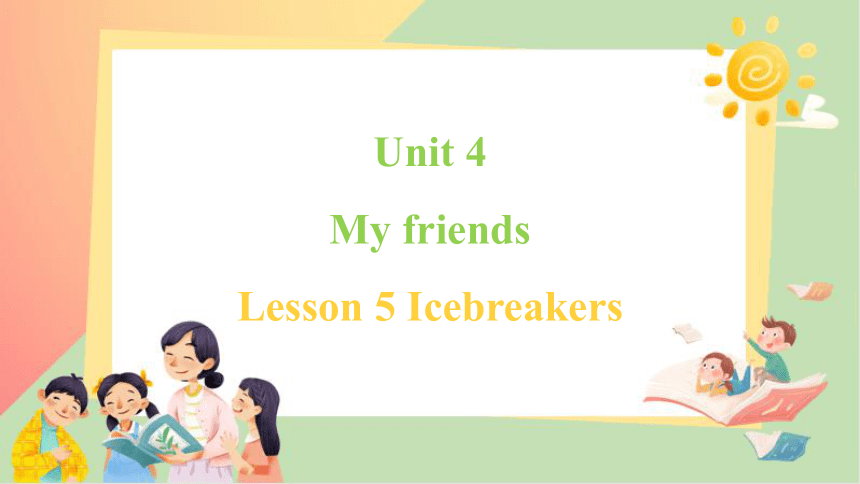(
课件网) Unit 4 My friends Lesson 5 Icebreakers To understand some icebreaker games. To describe yourself through games. To describe the students you are interested in and make cards for them. 学习目标 1 2 3 What words would you use to describe yourself Kind. Bright. Lead in Li Ming wants to learn more about working well in groups. So he joins a club. The club gets students to play some icebreaker games to help them get to know one another. 新课讲授 1 Write words in the table and circle the word that best describes you. Then play Bingo. Work in groups.Brainstorm words to describe a person and write them in a table. Choose and circle one word to describe yourself. kind shy honest brave cute bright quiet warm-hearted easy-going See if the three words your group members circled can make a line. If so, Bingo! kind shy honest brave cute bright quiet warm-hearted easy-going 2 Share three things about yourself. I think I'm very warm-hearted. I love playing the erhu. My best friend is Li Ming. Find out who has two or three things in common with you. That student will stand up and you two will greet each other. 3 Meet another friend. Pay attention to the student you are interested in. Choose one word to describe him/her. Talk with that student and get more information about him/her. 4 Make cards for your icebreaker game. Now you have two new friends. Make a card for each of them. I think Wang Lei is quiet. He thinks he is careless. He often forgets things. We both like to play the erhu. He likes sports too. We both enjoy reading stories. We will play basketball together after school. I broke the ice with Wang Lei I broke the ice with_____ “get to know 意为 了解;认识”,后面通常接人或事物,表示逐渐了解某人或某事的过程。 e.g. I want to get to know you better. 我想更好地了解你。 It takes time to get to know a new city. 了解一个新城市需要时间。 We got to know each other during the summer camp. 我们在夏令营期间认识了彼此。 The club gets students to play some icebreaker games to help them get to know one another. Language points 2. Find out who has two or three things in common with you. “in common 意为 共同的”,“have...in common” 表示 “有…… 共同之处”,其中 “have” 可根据主语和时态进行变化。 e.g. We have a lot in common. We both like reading and travelling. 我们有很多共同之处。我们都喜欢阅读和旅行。 The two paintings have some features in common. 这两幅画有一些共同的特点。 3. Pay attention to the student you are interested in. “pay attention to 意为 注意;关注”,后面可接名词、代词或动名词。 e.g. Pay attention to your teacher in class. 在课堂上注意听你的老师讲课。 We should pay attention to our health. 我们应该关注我们的健康。 Pay attention to listening carefully when others are speaking. 当别人说话时,注意认真倾听。 4. I love playing the erhu. “erhu” 意为 “二胡”,“play the erhu” 表示 “拉二胡”,“play” 与乐器类名词搭配时,中间通常要加定冠词 “the”。 e.g. She is good at playing the erh ... ...

